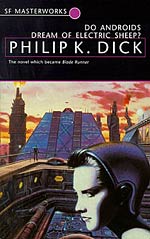
![]() Grayman14
Grayman14
2/1/2016
![]()
"We live in a society in which spurious realities are manufactured by the media, by governments, by big corporations, by religious groups, political groups. I ask, in my writing, 'What is real?' Because unceasingly we are bombarded with pseudo realities manufactured by very sophisticated people using very sophisticated electronic mechanisms." - Philip K. Dick
Philip K. Dick was almost always questioning "reality" in his works. His stories often have the effect of making the reader question "What is real?" There is a brilliant scene in 'Electric Sheep' where Dick has his main character grasping at the edges of his own reality as his everyday life seems about to be pulled from under him. *(spoiler warning)* Imagine if you are taken, suddenly, to a different branch of your workplace. It's in the same city but you have never heard of it until now. There is no record of you on the company files and no one has ever heard of you there.*(spoiler end)* How would you feel? Perhaps you would feel a bit like Dick himself who began to question whether he was writing his stories or his stories were writing him. "Sometimes it feels like I'm living in a PKD novel." (Thanks to 'The Exegesis of PKD' and nikki@bookpunks for organising the read-a-long!).
This is not a five-star classic but there is something about it that I just love. It was my second time to read it and I feel I got a lot more from it this time. On the surface it seems like a rather simple detective story set in a speculative near-future with androids as the villains. But there is so much more going on in here. This slim volume addresses themes of loneliness, sentience, the value of life, emotions, empathy, reality, and the influence of a celebrity-worshipping media. It also offers a glimpse of what a future religion might be like with people using a kind of virtual reality "empathy box" to share their moods and co-experience pain and suffering. Most of the characters feel real right from the start, and the world Dick describes is very well realised, despite his brief, rather simple descriptions.
"When he landed the police department hovercar on the roof of the Rosen Association Building in Seattle he found a young woman waiting for him. Black-haired and slender, wearing the new huge dust-filtering glasses, she approached his car, her hands deep in the pockets of her brightly striped long coat. She had, on her sharply defined small face, an expression of sullen distaste."
It is mundane as well as futuristic. The main character, android bounty hunter Rick Deckard, worries about work, about his wife's moods, about making enough money to buy a pet. He questions his ability to perform his job, complains of being tired, and worries about what the neighbors think. There is an interesting depiction of peer pressure involving the ownership of "real" rather than "artificial" animals. Flesh and blood animals have become rare due to the radioactive dust in the Earth's atmosphere. Thus we witness Deckard spending a lot of his time checking the price listings of animals in pet catalogues and haggling in pet stores. An electric sheep isn't good enough for him. He wants something real. And if the neighbors or his co-workers ever found out his sheep was artificial, ....
"God" Rick said futilely, and gestured empty-handed. "I want to have an animal; I keep trying to buy one. But on my salary, on what a city employee makes -".
Please click on the link below to read my full review:)
https://biginjapangrayman.wordpress.com/2016/02/01/do-androids-dream-of-electric-sheep-1968-by-phili